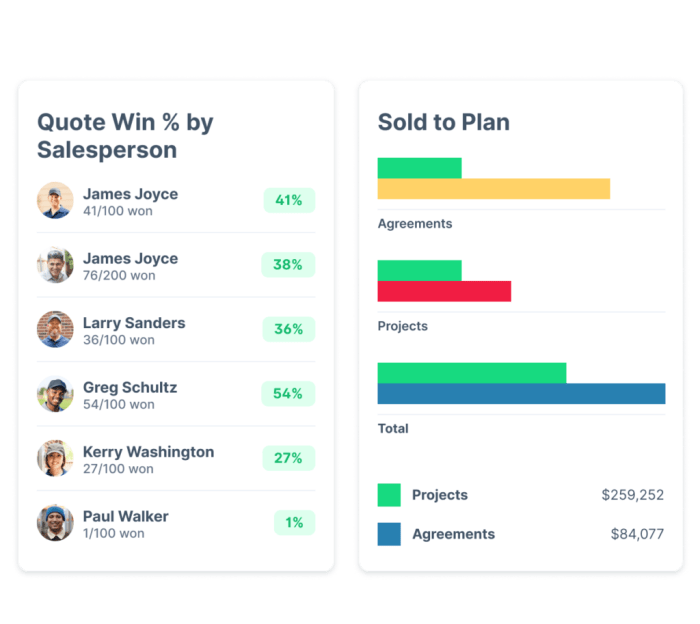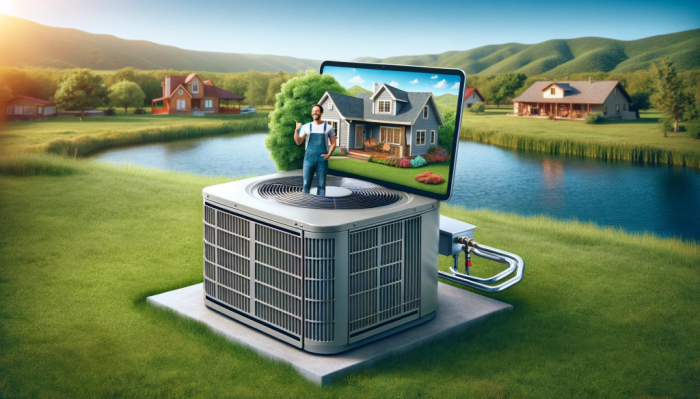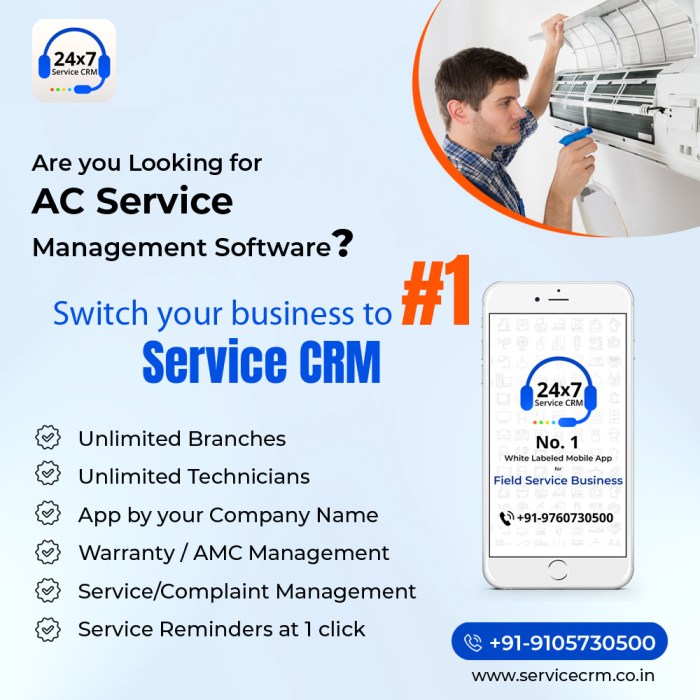Crm software for hvac companies – In today’s competitive HVAC landscape, efficient operations and customer satisfaction are paramount. This is where Customer Relationship Management (CRM) software steps in, offering HVAC companies a powerful tool to streamline processes, enhance customer relationships, and ultimately boost profitability. This comprehensive guide delves into the specifics of CRM software tailored for HVAC businesses, exploring its benefits, key features, selection criteria, and implementation strategies.
Understanding the HVAC Industry’s Unique CRM Needs
HVAC businesses face unique challenges that demand a specialized CRM solution. Unlike other industries, HVAC companies often deal with:
- Service calls and appointments: Scheduling, dispatching, and tracking technicians in the field require robust scheduling and routing capabilities.
- Inventory management: Tracking parts, supplies, and equipment is crucial for efficient operations and minimizing downtime.
- Complex service agreements: Managing maintenance contracts, warranties, and service level agreements (SLAs) requires a system that can handle recurring billing and track service history.
- Highly technical service records: Detailed records of equipment, repairs, and customer interactions are essential for accurate troubleshooting and efficient service.
- Mobile workforce: Technicians need access to customer information and scheduling updates in the field, necessitating a mobile-friendly CRM.
A CRM tailored for HVAC companies addresses these specific needs, providing features that streamline operations and improve customer service.

Source: servicetrade.com
Key Features of a Top-Tier HVAC CRM
The best CRM for your HVAC business will offer a comprehensive suite of features designed to address your specific operational challenges. Here are some key features to look for:
Appointment Scheduling and Dispatching
- Automated scheduling: Reduces manual scheduling efforts and minimizes scheduling conflicts.
- Optimized routing: Minimizes travel time for technicians, improving efficiency and reducing fuel costs.
- Real-time tracking: Allows you to monitor technician location and progress in the field.
- Customer communication: Provides tools for automated appointment reminders and confirmations.
Customer Relationship Management, Crm software for hvac companies
- Centralized customer database: Provides a single source of truth for all customer information, including service history, contact details, and preferences.
- Personalized communication: Enables targeted marketing campaigns and personalized service interactions.
- Customer segmentation: Allows you to group customers based on various criteria, such as service history or location, for targeted marketing and service.
- Customer satisfaction tracking: Provides tools to measure customer satisfaction and identify areas for improvement.
Inventory Management
- Real-time inventory tracking: Provides visibility into current stock levels and helps prevent stockouts.
- Automated ordering: Triggers automatic orders when inventory levels fall below a predefined threshold.
- Part tracking: Tracks the location and status of parts, ensuring efficient inventory management.
Service Management
- Work order management: Streamlines the creation, assignment, and tracking of work orders.
- Automated reporting: Generates reports on key performance indicators (KPIs), such as service completion rates and customer satisfaction.
- Service history tracking: Provides a complete history of all service calls and repairs for each customer.
Mobile Accessibility
- Mobile app: Allows technicians to access customer information, scheduling updates, and work orders in the field.
- Offline access: Enables technicians to access critical information even without an internet connection.
Choosing the Right HVAC CRM Software
Selecting the right CRM software requires careful consideration of your business needs and budget. Here are some key factors to consider:
- Scalability: Choose a CRM that can grow with your business.
- Integration: Ensure the CRM integrates with your existing software, such as accounting and payroll systems.
- Ease of use: Select a CRM that is intuitive and easy for your team to use.
- Customer support: Choose a provider that offers excellent customer support and training.
- Pricing: Consider the total cost of ownership, including software licensing, implementation, and training costs.
Implementing and Optimizing Your HVAC CRM
Successful CRM implementation requires a well-defined plan and ongoing optimization. Consider these steps:
- Data migration: Carefully plan and execute the migration of existing customer data into the new CRM system.
- User training: Provide comprehensive training to your team on how to use the new CRM system.
- Process optimization: Review and optimize your business processes to take full advantage of the CRM’s capabilities.
- Ongoing monitoring and improvement: Regularly monitor the performance of your CRM system and make adjustments as needed.
Frequently Asked Questions (FAQ)
- Q: What is the cost of HVAC CRM software? A: The cost varies widely depending on the features, number of users, and provider. Expect to pay anywhere from a few hundred dollars per month to several thousand dollars per year.
- Q: How long does it take to implement an HVAC CRM? A: Implementation time depends on the complexity of your business and the chosen CRM system. It can range from a few weeks to several months.
- Q: Can I integrate my HVAC CRM with other software? A: Yes, many HVAC CRMs offer integration with other business software, such as accounting, payroll, and scheduling systems. Check the provider’s documentation for details on available integrations.
- Q: What are the benefits of using an HVAC CRM? A: Benefits include improved customer satisfaction, increased efficiency, better inventory management, reduced costs, and enhanced profitability.
- Q: What are some popular HVAC CRM software options? A: Several reputable providers offer solutions; research options like ServiceTitan, Housecall Pro, and JobNimbus to find the best fit for your business. Always compare features and pricing before making a decision.
Conclusion
Investing in the right CRM software is a strategic move for any HVAC company looking to improve efficiency, enhance customer relationships, and drive growth. By carefully considering your specific needs and selecting a solution with the right features, you can unlock the full potential of your business and stay ahead of the competition. Don’t hesitate to explore the options available and find the perfect CRM partner to help your HVAC business thrive.

Source: leadmakermedia.com
Call to Action
Ready to transform your HVAC business with a powerful CRM? Contact us today for a free consultation and let us help you find the perfect solution to meet your unique needs.
FAQ Corner: Crm Software For Hvac Companies
What are the key features to look for in HVAC-specific CRM software?
Essential features include service scheduling, job dispatch, inventory management, customer communication tools, and reporting/analytics specifically tailored to the HVAC industry’s needs. Integration with other business systems is also highly beneficial.
How much does HVAC CRM software typically cost?
Pricing varies greatly depending on the features, number of users, and vendor. Expect monthly subscription fees ranging from basic packages to more comprehensive solutions with higher price points.

Source: tumblr.com
How long does it take to implement HVAC CRM software?
Implementation time depends on the complexity of the system and the size of the company. It can range from a few weeks to several months, including data migration and employee training.
What are the potential challenges of implementing HVAC CRM software?
Challenges include data migration issues, employee resistance to change, integration with existing systems, and the need for ongoing training and support. Careful planning and effective change management are crucial for successful implementation.
